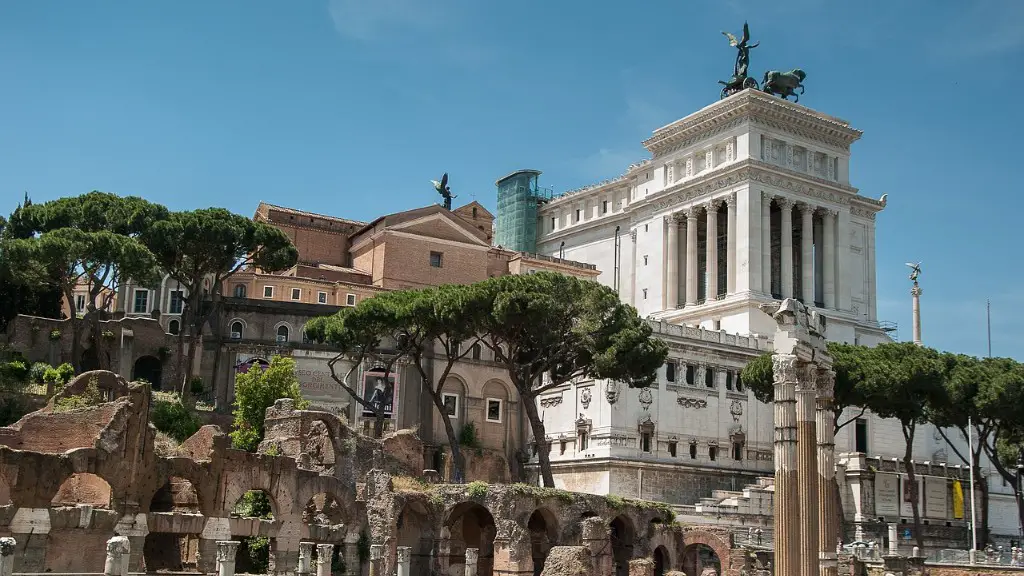Background
Cincinnatus is renowned in ancient Roman history as a model of civic virtue and military genius. He was a peasant farmer and served as consul and dictator in the Roman Republic from 458 to 439 BC. He is noted for his humble beginnings and selfless service. He chose to serve Rome in times of great crisis and embodied the ideal of Roman Republicanism. He is venerated today as a symbol of the promise of democracy, self-sacrifice and civic virtue.
Overview of the Character of Cincinnatus
Cincinnatus was of humble origins, a small-scale farmer living in a modest estate just outside of Rome. He was noted for his stoic austerity, kindness, honor, and bravery. His life was filled with service to his home and his city, both of which were in need of leadership during times of crisis. He was most noted for his refusal of the rewards of power after his military successes, instead asking the Senate to end his term of office once the crisis had been averted.
Political and Military Accomplishments
Cincinnatus was an accomplished military leader. During the war with the Aequi, he was credited with victory after a hard-fought battle at Algidum. After this, he was appointed as dictator for six months, during which he repelled an invasion by the Volsci. He then voluntarily relinquished his authority. Later in his life, he was elected consul twice.
Reasons For Adoration In Ancient Rome
The Roman people admired Cincinnatus for his unselfish service to the Republic. His refusal to accept rewards and honors after his success in the Volscian War was seen as a symbol of true dedication to the cause of Rome. He embodied the values of Republicanism and was a symbol of humility, dedication, and leadership. The Roman people saw him as a model of what a leader should be; a self-sacrificing patriot who placed the needs of his country above his own.
Symbolic Meaning
Cincinnatus is also seen as a symbol of democracy and civic virtue. His story is a classic example of individual citizens rising to the challenges of their times, and using their power to serve the greater good. His rise to power and subsequent refusal of reward serve as an illustration of what it means to be part of a civic republic.
Modern Adoption of Cincinnatus
Today, Cincinnatus remains an inspiration to many. He is seen as a symbol of self-sacrifice, duty, and patriotism. Modern-day American institutions such as the United States Military Academy at West Point, the Cincinnati Public Library, and the Order of Cincinnati are all named in his honor.
Cincinnatus in Pop Culture
Cincinnatus has been referenced in pop culture by several modern-day figures. One of the most prominent examples is Ronald Reagan, who credited Cincinnatus as a major influence on his own political philosophy. Cincinnatus is also famously referenced in the opening line of Herman Melville’s classic novel Moby-Dick, in which the narrator states, “Call me Ishmael, like Cincinnatus of old, I take my stand.”
Continued Relevance
Cincinnatus is an enduring figure in the history of Rome and indeed the world. His story of self-sacrifice and dedication to duty serves as an inspiration to many. Even today, he is revered as a symbol of what it means to be a leader. His legacy continues to be relevant in modern-day society, and it is likely that the respect and admiration he garnered in the Roman Republic will be felt for generations to come.
Contrasting Perspective
However, not all view Cincinnatus in the same light: some contend that his power was not used for the benefit of Rome, but instead to his own ends and that of his family. His consulship was a family affair, and some believe that Cincinnatus used his political power to advance the interests of him and his kin.
Historical Criticism
Critics of Cincinnatus point to his refusal of rewards and honors as evidence of his ambition. They argue that his acquiescence to the Senate indicates his desire to maintain the appearance of humility, but in reality furthers his own interests. He does not, in their estimation, embody the pure ideals of Republicanism, as his actions are ultimately self-serving.
Recent Analysis
In recent years, scholars have criticized the traditional interpretation of Cincinnatus, suggesting instead that his actions demonstrate a greater willingness to serve the public good. They argue that his refusal to accept the rewards and honors of power was actually a gesture of respect for the Roman Senate, showing that even in times of great crisis, civilian authority should be respected and followed.
Conclusion of Character
Ultimately, Cincinnatus will remain an important figure in Roman history. He is seen as a symbol of virtue and selfless service, while his critics claim that he was driven more by ambition than virtue. But whatever one’s perspective, Cincinnatus is a shining example of what it means to be a leader and a patriotic citizen. His legacy will continue to be felt for centuries to come.


